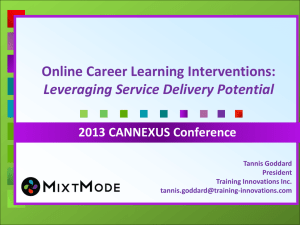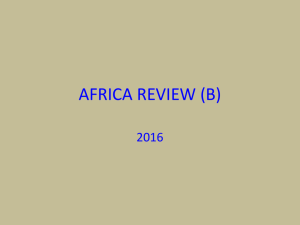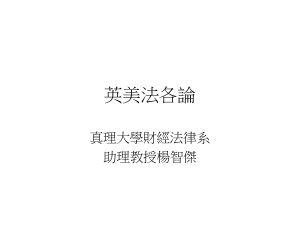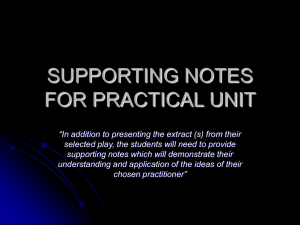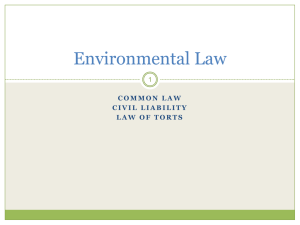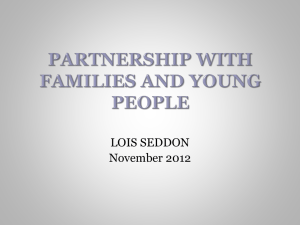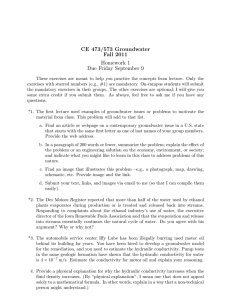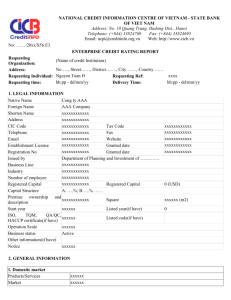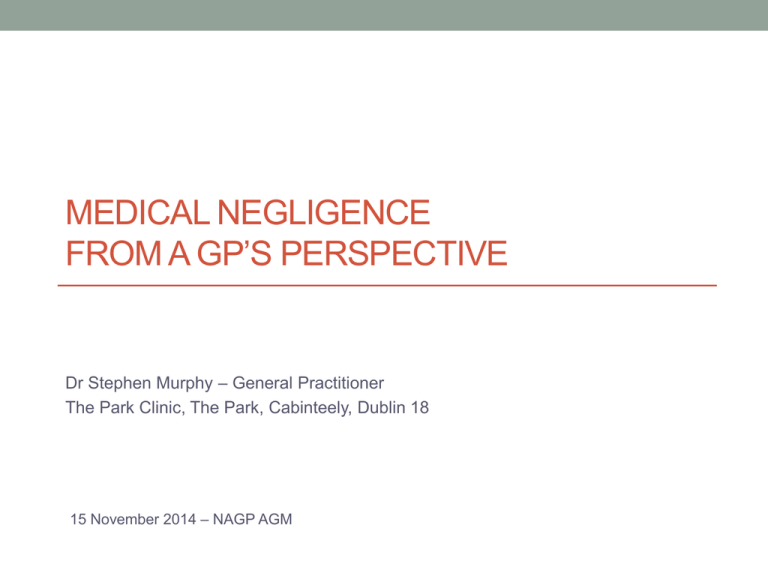
MEDICAL NEGLIGENCE
FROM A GP’S PERSPECTIVE
Dr Stephen Murphy – General Practitioner
The Park Clinic, The Park, Cabinteely, Dublin 18
15 November 2014 – NAGP AGM
Who am I?
• Full time General Practitioner x 32 years
• 6 doctor practice in South Dublin – 3 female, 3 male
• 18,400 registered patients age from 0 – 102 years
• 75% Private - 25% General Medical Services (Med Card)
• Practice conducted 29,600 consultations in 2013
• Practice prescribed 84,000 medicines in 2013
• Practice gave 2100 vaccinations in 2013
(infant/child/travel)
• 2140 Practice referrals to OPD/A&E/Specialists (6% RR)
• 104 births and 17 deaths
What do I do?
• Full time General Practitioner
• A ‘Generalist’ with an interest in Civil DNA relationship
•
•
•
•
•
testing, Cognitive Behavioral Therapy and Medico-Legal
Medicine.
M.Sc. in 2008 in Forensic & Legal Medicine (UCD)
80% Defense : 20% Plaintiff in 2010
78% Defense : 22% Plaintiff in 2013
Expert Reports for Medical Protection Society, Medical
Defence Union, State Claims Agency & Plaintiffs
Medical Council Fitness to Practise Hearings - Chief
Executive and Defence & Preliminary Proceedings
Committee
What is a General Practitioner?
THE SHORT EUROPEAN DEFINITION OF GENERAL PRACTICE / FAMILY MEDICINE
General practitioners/family doctors are specialist physicians trained in the principles of the
discipline. They are personal doctors, primarily responsible for the provision of comprehensive and
continuing care to every individual seeking medical care irrespective of age, sex and illness. They
care for individuals in the context of their family, their community, and their culture, always
respecting the autonomy of their patients. They recognise they will also have a professional
responsibility to their community. In negotiating management plans with their patients they
integrate physical, psychological, social, cultural and existential factors, utilising the knowledge
and trust engendered by repeated contacts. General practitioners/family physicians exercise their
professional role by promoting health, preventing disease providing cure, care, or palliation and
promoting patient empowerment and self-management. This is done either directly or through the
services of others according to health needs and the resources available within the community they
serve, assisting patients where necessary in accessing these services. They must take the
responsibility for developing and maintaining their skills, personal balance and values as a basis for
effective and safe patient care. Like other medical professionals, they must take responsibility for
continuously monitoring, maintaining and if necessary improving clinical aspects, services and
organisation, patient safety and patient satisfaction of the care they provide.
European Academy of Teachers in General Practice – 2012
What do GP’s really do?
“Specialists aim to reduce uncertainty, explore
possibility and marginalise error.
General Practitioners aim to accept uncertainty,
explore probability and marginalise danger…”
Dr Marshall Marinker. Bayliss Lecture.
Royal College of Physicians (London), 1994
Spectrum of General Practice
“For my entire career I have been convinced that general
practice is the hardest specialty to do well, and probably
the easiest to do badly.
GPs deal in uncertainty all the time.
The next patient could have schizophrenia or piles,
unhappiness or cardiac arrest, anything and everything,
and in no particular order.”
Dr David Haslam BMJ Career Focus 2012;331:151-152
Chair: British Medical Association 2011-2012
Chair: National Institute for Clinical Excellence
Indemnifiers & Insurers
• Medical Protection Society (Indemnifier)
• Medical Defence Union (Indemnifier)
• Medisec (Insurance underwritten by Allianz PLC)
• Self – contrary to Section 50 of Medical Council’s guide to
Conduct and Ethics for Registered Medical Practitioners –
“You must ensure that you have adequate professional
indemnity cover for all the healthcare services that you provide.”
• Medical Practitioners (Amendment) Act 2014 (?) - to
amend the Medical Practitioners Act 2007 to provide a
requirement for registered medical practitioners to have
medical indemnity insurance.
The Law of Negligence
Three essential elements:
1.
A duty of care – the basis of the doctor/patient relationship.
2.
Breach of duty – failure to reach the required standard of care.
3.
Causation – harm or damage caused by a breach of duty.
Cases are decided on the civil not the criminal standard –
‘On the Balance of Probability.’
Causation
• To succeed, a Plaintiff must prove on the balance of
probabilities that an inappropriate act or omission caused
or made a material contribution to his injury
Negligence
• Negligence is a legal concept.
• It means a failure to attain a reasonable standard of care
•
•
•
•
and not neglect or willful misconduct.
Perhaps ‘Medical Accident’ is a better term than
‘Negligence’ when dealing with either Plaintiff or Medical
Defendant.
Any doctor can make an error of judgment.
Some errors are legally defensible, others are not.
What is important is whether the medical management
can or cannot be defended by a responsible body of
professional opinion.
The Dunne Case
• The test for establishing negligence in a patient’s
diagnosis or treatment derives from the Dunne v Jackson
and the National Maternity Hospital in which Finlay CJ set
out the principles that courts have since applied when
assessing the standard of care the patient received. This
judgment incorporated both the Bolam and the Bolitho
judgments.
The Dunne Test
The Chief Justice said that the true test for establishing
negligence in diagnosis or treatment on the part of a medical
practitioner is whether he has been proved to be guilty of such
failure as no medical practitioner of equal specialist or general
status and skill would be guilty of, if acting with ordinary care.
If the allegation of negligence against a medical practitioner is
based on proof that he deviated from a general and approved
practice that will not establish negligence unless it is also proved
that the course he did take was one which no medical practitioner
of like specialisation and skill would have followed had he been
taking the ordinary care required from a person of his
qualifications.
The Dunne Test
It is quite in order for an honest difference of opinion to arise
between two doctors as to which is the better of two ways of
treating a patient and the following of one course rather than the
other does not imply negligence. It is not up to the judge to
decide which of two alternative courses is in his opinion
preferable but his function is merely to decide whether the
course of treatment followed complied with the careful conduct of
a medical practitioner of like specialisation and skill to that
professed by the doctor in question.
However, even if the defendant can show that the management
accorded with general and approved practice, the Plaintiff will
still succeed if it can be shown that such management was
inherently defective.
Standard of Care in GP
• The implications of this for those in primary care are that the
standard against which one is judged is that of one's own peers
- not that of the wisest and most prudent doctor who exists.
• Certainly not that of a hospital consultant who may carelessly
venture expert opinion as to the correct management in general
practice.
• By the same principal, the experts who give evidence to the
Court about the standards in general practice can only be
general practitioners who were practising at the time of the case.
• The standard to be applied is not that of a most astute doctor or
a Professor of General Practice, but that of an ordinary and
competent GP acting reasonably & responsibly.
Some causes of medication errors
• Badly transcribed instructions
• Repeating or transcribing hospital prescription errors
• Illegible prescriptions
• Miscalculation of dosage
• Confusion between similar-sounding drug names or
•
•
•
•
•
•
similar-looking packages
Clicking on the wrong drug in a drop-down menu
Prescribing contraindicated drugs (relative)
Not checking for potential drug interactions (relative)
Not reviewing repeat prescriptions
Failure to follow up/monitor medication
Failure to act on laboratory results.
Some causes of administrative errors
• Failure to pass on important information
• Failure to arrange appointments, investigations or
referrals with the appropriate degree of urgency
• Failure to review the results of investigations
• Failure to arrange follow-up and monitoring
• Mislabeling, misfiling and failure to check labels.
Some causes of medical note problems
Some causes of medical note problems
• Notes written as an aide-memoir not for 3rd parties
• Not recording negative findings
• Not recording substance of discussions about the risks
•
•
•
•
•
•
and benefits of proposed treatments
Not recording drug allergies or adverse reactions
Not recording the results of investigations and tests
Illegible entries
Not reading the notes when seeing a patient (how
retrospective?)
Altering notes after the event (incorrectly)
Wrong patient/wrong notes.
Some causes of medical note problems
Mr XXXXXXXX XXXXXXXXXXX
XXX XXXXXX XXXX XXXXXXXXXXXX Co. Dublin
DOB: XX/XX/XXXX Age 49y 7m
Occupation: XXXXXXXXXXXX
04 June 2011
Travelling to Australia to visit XXXX. Stopping off in Thailand, Cambodia and Vietnam.
Need vaccinations. No C/I DPT, typhoid, hepatitis A given. Malaria prophylaxis discussed.
Also script for GI upset, insect bites. Advised aspirin no use for long haul. Advised against
hypnotic also. Rx Malarone after discussion.
Above note recorded by: XX
01 November 2011
Flu vaccination given left deltoid. No C/I
Above note recorded by: XX
16 December 2011
Telephone: Feeling guilty about leaving mother in nursing home over Christmas.
Counselled against taking mother out in view of osteoporotic fractures.
Above note recorded by: XX
16 February 2012
URTI and coughing x 2 weeks. Has tried OTC meds. Feeling exhausted but having
difficulty sleeping with cough. Low energy, low mood and appetite poor. No sputum. Cough
O/E T 36.6 P 80 s/r ENT all red. No adenitis. Chest scattered crackles but nil localising.
dry.
Mild wheeze.
Rx Co-Amoxyclav 625mg, Deltacortril 30mg x 5/7. Review if not settling.
Above note recorded by: XX
1 March 2012
crackles
day after.
Still coughing – slight pink stain to otherwise clear sputum.
Still exhausted and off food. O/E T 36.6 P 80 s/r ENT all red. No adenitis. Chest scattered
but nil localising. Mild wheeze. Refer to XXXXXXXXXXXXXXXX for CXR and phone me
Above note recorded by: XX
Mr XXXXXXXX XXXXXXXXXXX
XXX XXXXXX XXXX XXXXXXXXXXXX Co. Dublin
DOB: XX/XX/XXXX Age 49y 7m
Occupation: XXXXXXXXXXXX
5 March 2011
CXR shows suspicious lesion R lower lobe – Lung primary cannot be excluded –
referral for further specialist evaluation, including CT scan of Thorax, advised.
Above note entered by: XXXXXX XXXXXXXXXX via Healthlink.
22 October2011
Flu vaccination given left deltoid. No C/I
No follow up on CXR from last March. Urgent respiratory consult with XX XXXXXXXXXXX
in
XXXXXXXXXXX Hospital arranged. xxReferral Letter.rtfxx faxed through.
Above note recorded by: XX
05 November 2011
Telephone: XX XXXXXXXXXXX phoned – bronchoscopy/washings/biopsy confirmed
non-small cell lung Ca.
Above note recorded by: XX
06 November 2011
Called round to see XXXXXXXX and said how sorry I was to have missed his report. He
said that he forgot to call and then assumed that as he hadn’t heard all was OK. Said he
disappointed and felt I had let him down. I apologised again and said that I
expedite treatment etc.
Above note recorded by: XX
was upset and
would do all I could to
14 November 2011
Mrs XXXXXXXXXXX phoned and said that they wanted the whole family’s notes transferred
to Dr XXXXXXX XXXXXXXXXXX
Above note entered by: XXXXXX XXXXXXXXXX
04 December 2011
Letter from XXXXXXXXX XXXXXXXXX & Co requesting copies of all notes and records.
Consent√
Above note by: XX
High-risk patients and high-risk medications
Medication errors make up a fifth of all errors occurring in
general practice, and many of these are preventable1.
Some patients are especially likely to experience serious
adverse events due to prescribing errors.
These include:
• Patients over 65 years and under 16 years of age
• Patients on four or more medicines
• Patients recently discharged from hospital and/or
attending hospital outpatient departments.
• The primary-secondary care interface is especially
hazardous. All medicines are hazardous, but some are
more hazardous than others.
1. NHS National Prescribing Centre (UK), Saving time, helping patients: A good practice guide to quality repeat
prescribing (2004)
High-risk patients and high-risk medications
• Some medicines frequently cause serious harm,
•
•
•
•
•
•
•
warranting special care and rigorous monitoring,
including:
Non-Steroidal Anti-inflammatory Drugs
Benzodiazepines
Oral and topical steroids
Oral contraceptives
Anti-depressants
Opiates
Potentially toxic medicines: methotrexate, DMARDs,
lithium, azathioprine, warfarin, “Biologics.”
Failure to diagnose, investigate or treat:
• Acute cardiac events – especially out-of-hours
• Deep Vein Thrombosis
• Cauda Equina Syndrome
• Meningitis
• Fractures
• Cancer – particularly breast, skin, prostate, bowel, lung &
•
•
•
•
•
brain
Ectopic Pregnancy
Hand infections
Hypertension
Appendicitis (and other bowel infections)
Sudden death (from almost any cause)
Duties of GP Expert include
• Duty is to the Court and not the Instructing Solicitor/Client
• Report should be free standing
• Report should be comprehensible with technical and
•
•
•
•
•
•
medical terms explained
Report should contain an overview and chronology
The opinion should contain the relevant facts used to arrive
at the opinion
Disputed or contentious facts/issues/opinion(s) identified
Opinion should address the questions asked
Opinion should be confined to the expert’s field of expertise
and should never answer ‘The Ultimate Question’
Report should be timely
A Solicitor’s view
Ernest J. Cantillon – Solicitor – Co. Cork
• “We always seek to retain conservative experts with top-
class reputations. There is no point in retaining somebody
who would tell you what you want to hear, as that person will
invariably fail to stand up to cross examination.”
• “There can be difficulties in getting experts to assist. Whilst
one may find and identify an expert in a particular
subspecialty, they may not have medicolegal experience.
This can create difficulties when it comes to the content of
their report. That is to say, it may not address matters that
require to be addressed in medicolegal context.”
Expert’s relationship with the Court
• Expert must avoid bias:
• The trial judge in Vakauta v Kelly referred to the defence
medical experts as:
• “That unholy trinity”….and continued saying that the GIO's
usual panel of doctors "think you can do a full weeks work
without any arms or legs" and that the three doctors
involved in this case - Drs Lawson, Revai and Dyball expressed opinions which were "almost inevitably slanted
in favour of the GIO by whom they have been retained,
consciously or unconsciously".
(1989) 87 ALR 633
Tips to avoid litigation (and sleep well)
• Make good contemporaneous notes.
• Record numbers – Temp 36.1oC, BP 132/86, P 78 bpm sinus rhythm
• Record negative as well as positive findings
• Record all patient contacts especially telephone conversations.
• Record all DNAs (Did Not Arrive).
• Always give and record consultation follow-up advice.
• Detect and act upon abnormal results.
• Choose computer software that encourages good records.
• Give greatest weight to the more serious diagnosis.
• Litigation harms doctor and patient alike - some patients just want an
apology, which can go a long way - but, they may still sue.
• Response letters to complaints need to be written extremely carefully.
• Consult your medical insurance company - they are the experts.
• Remember, we all make mistakes; that's why we pay insurance.
And finally……………….
Today I do not want to be a doctor
Dr Glen Colquhoun
• Today I do not want to be a doctor - no one is getting any better.
• Those who were well are sick again and those who were sick are sicker.
• The dying think that they will live and the healthy think they are dying.
• Someone has taken too many pills. Someone has not taken enough.
• A woman is losing her husband. A husband is losing his wife.
• The lame want to walk. The blind want to drive.
• The deaf are making too much noise.
• The depressed are not making enough.
• The asthmatics are smoking.
• The alcoholics are drinking.
• The diabetics are eating chocolate.
• The mad are beginning to make sense.
• Everybody’s cholesterol is high.
• Disease will not listen to me - even when I shake my fist.



